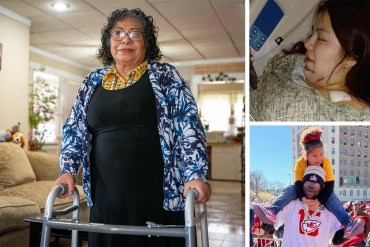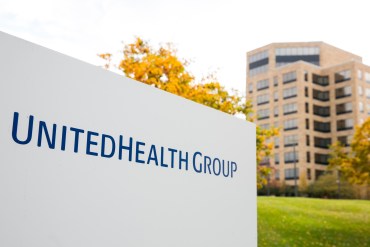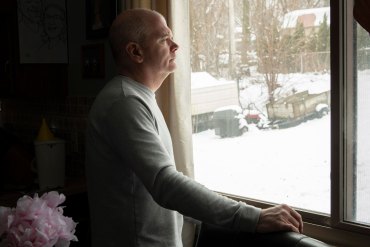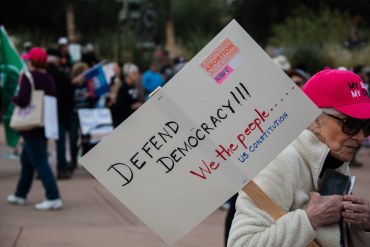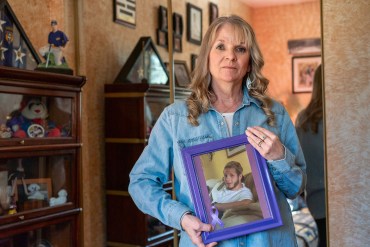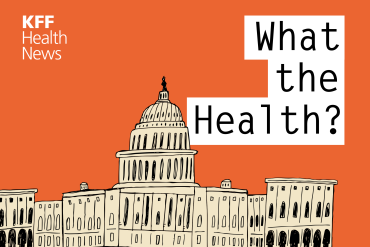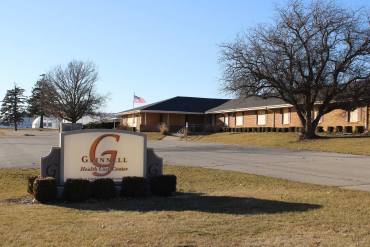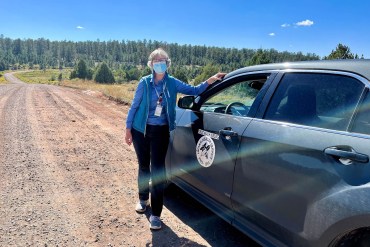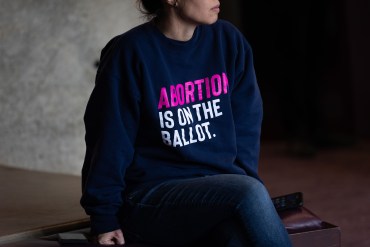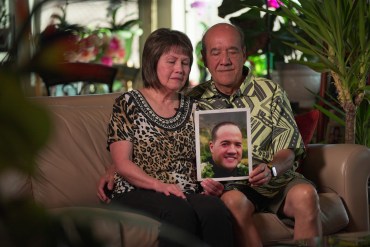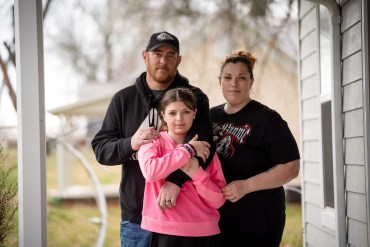Paid Sick Leave Sticks After Many Pandemic Protections Vanish
The U.S. is one of nine countries that do not guarantee paid sick leave. Since the covid pandemic, advocates in states including Missouri, Alaska, and Nebraska are organizing to take the issue to voters with ballot initiatives this November.
A casi tres meses del tiroteo en el desfile del Super Bowl de los Kansas City Chiefs, que dejó al menos 24 personas heridas, recuperarse de esas heridas es algo profundamente personal e incluye una sorprendente área gris de la medicina: si las balas deberían o no extraerse.
Three People Shot at Super Bowl Parade Grapple With Bullets Left in Their Bodies
Despite the rise of gun violence in America, few medical guidelines exist on removing bullets from survivors’ bodies. In the second installment of our series “The Injured,” we meet three people shot at the Kansas City Super Bowl parade who are dealing with the bullets inside them in different ways.
Medical Providers Still Grappling With UnitedHealth Cyberattack: ‘More Devastating Than Covid’
Medical providers say they’re still coping with the Change Healthcare cyberattack disclosed in February even though parent company UnitedHealth Group reported that much is back to normal and its revenue is up over last year.
He Thinks His Wife Died in an Understaffed Hospital. Now He’s Trying to Change the Industry.
Nurses are telling lawmakers that there are not enough of them working in hospitals and that it risks patients’ lives. California and Oregon legally limit the number of patients under a nurse’s care. Other states trying to do the same were blocked by the hospital industry. Now patients’ relatives are joining the fight.
Medicare’s Push To Improve Chronic Care Attracts Businesses, but Not Many Doctors
Most Medicare enrollees have two or more chronic health conditions, making them eligible for a federal program that rewards physicians for doing more to manage their care. It shows promise in reducing costs. But not many doctors have joined.
Native Americans Have Shorter Life Spans. Better Health Care Isn’t the Only Answer.
Social services, such as parenting classes and economic development programs, can help increase the life spans of Native Americans, some health experts say. But insurers don’t always cover these services.
Conservative Justices Stir Trouble for Republican Politicians on Abortion
Republicans are learning the admonition “be careful what you wish for,” as conservative judges cause them political problems over abortion in a crucial election year.
Swap Funds or Add Services? Use of Opioid Settlement Cash Sparks Strong Disagreements
The national opioid settlements don’t prohibit using money for initiatives already supported by other means, but doing so could dilute the impact.
What the Health? From KFF Health News: Arizona Turns Back the Clock on Abortion Access
A week after the Florida Supreme Court said the state could enforce an abortion ban passed in 2023, the Arizona Supreme Court ruled that state could enforce a near-total ban passed in 1864 — over a half-century before Arizona became a state. The move further scrambled the abortion issue for Republicans and posed an immediate quandary for former President Donald Trump, who has been seeking an elusive middle ground in the polarized debate. Alice Miranda Ollstein of Politico, Rachel Cohrs Zhang of Stat, and Rachel Roubein of The Washington Post join KFF Health News’ Julie Rovner to discuss these stories and more. Also this week, Rovner interviews KFF Health News’ Molly Castle Work, who reported and wrote the latest KFF Health News-NPR “Bill of the Month” feature, about an air-ambulance ride for an infant with RSV that his insurer deemed not medically necessary.
Congress Likely to Kick the Can on Covid-Era Telehealth Policies
With an end-of-year deadline and a presidential election approaching, payment rules that fueled rapid expansion of telehealth in the United States face a last-minute congressional decision.
End of Internet Subsidies for Low-Income Households Threatens Telehealth Access
A federal program that helped pay for more than 23 million low-income households’ internet access runs out of money soon. The end of the subsidy launched earlier in the pandemic could have profound impacts on health care access.
Hospitals Cash In on a Private Equity-Backed Trend: Concierge Physician Care
Hospitals are increasingly stretching a velvet rope, offering “concierge service” to an affluent clientele. Critics say the practice exacerbates primary care shortages.
For-Profit Companies Open Psychiatric Hospitals in Areas Clamoring for Care
State institutions and community hospitals have closed inpatient mental health units, often citing staffing and financial challenges. Now, for-profit companies are opening psychiatric hospitals to fill the void.
The Burden of Getting Medical Care Can Exhaust Older Patients
It’s estimated that an older patient can spend three weeks of the year getting care — and that doesn’t count the time it takes to arrange appointments or deal with insurance companies.
Adultos mayores, agotados por tener que organizar tanta atención médica
Un nuevo estudio revela que los pacientes de Medicare dedican aproximadamente tres semanas al año a hacerse pruebas médicas, ver a doctores, someterse a tratamientos o procedimientos médicos, o pasar tiempo en el hospital o en centros de rehabilitación.
Rapid Rise in Syphilis Hits Native Americans Hardest
With U.S. syphilis rates climbing to the worst level in seven decades, public health experts and the federal Indian Health Service are scrambling to detect and treat the disease in Native American communities, where babies are infected at a higher rate than in any other demographic.
As money flows to abortion rights initiatives in states, some donors focus on where anger over the “Dobbs” ruling could propel voter turnout and spur Democratic victories up and down the ballot, including in key Senate races and the White House.
As More States Target Disavowed ‘Excited Delirium’ Diagnosis, Police Groups Push Back
After California passed the first law in the nation to limit the disavowed term “excited delirium,” bills in other states are being introduced to help end use of the diagnosis. But momentum is being met with resistance from law enforcement and first responder groups, who cite free speech.
They Were Injured at the Super Bowl Parade. A Month Later, They Feel Forgotten.
In the first of our series “The Injured,” a Kansas family remembers Valentine’s Day as the beginning of panic attacks, life-altering trauma, and waking to nightmares of gunfire. Thrown into the spotlight by the shootings, they wonder how they will recover.





